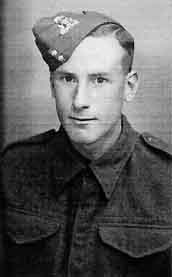|
Signalman Herbert Horrocks Ashibetsu POW Camp |
Hak-01B British roster
|
Signalman Herbert Horrocks 30 June 1940: Joined Lancashire Fusiliers (basic training) 09 Oct 1940: Transferred to South Lancashire Regiment Unk Date: Joined Royal Signals |
Family recollection (post war) Courtesy of Mr John Horrocks Herbert told me that from Singapore he sailed to Hakodate on the northern island of Hokkaido where he spent the summer fishing, while much of the winter was spent coal mining. Independent evidence suggests that coal mining was the main occupation. Herbert remarked to me wryly that he had travelled half way round the world to do the very job he would do his utmost to avoid at home! Conditions were harsh but, apart from surviving on meagre rations, your father mentioned only two examples of Japanese brutality. At Sapporo, with snow on the ground and falling, Herbert took a short cut between two huts and was made to stand with his hands above his head all night in sub zero conditions. Next morning his mates revived him by wrapping him in blankets. In Hakodate, back from fishing, the men were paraded and searched. One POW had a fish concealed in his shorts and he was made to eat it, bones and all, there and then When the Americans relieved the camp the Japanese Commandant asked the senior allied officers to lock all the Japanese soldiers in the cells so that the angry townsfolk would not attack them for surrendering. So by the time the US forces arrived the allied p.o.ws were on parade ready for inspection. I am not sure if it was an aircraft carrier or a destroyer that took Herbert around the Pacific for the next six weeks, but it provided ample relaxation, be it recovering lost appetites (all that rich American food!) , acquiring a tan (or sunburn, of which more later) or catching up with civilisation (in other words US movies). I doubt if the ship docked in Vancouver. More likely in one of US ports like San Francisco or Seattle. The English contingent eventually travelled eastwards from Vancouver via the Kicking Horse Pass in the Rockies to, possibly, Halifax, Nova Scotia, thence to England in time for Christmas 1945. |
